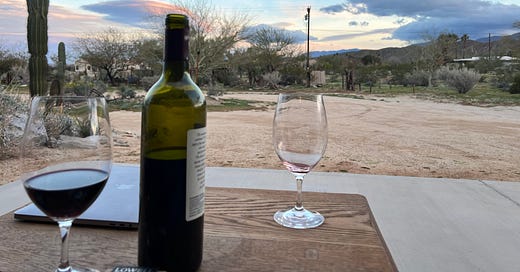In my experience, there are two distinct ways a conversation unfolds.
The first is narrator-driven, where the speaker shares information in the order they choose. It’s like reading a book, and if you’re lucky, the narrator is a great storyteller. The interviewee decides how, when, and what to say.
The second is audience-driven, where the person asking the questions directs what information is shared, in what order. It’s like surfing the web, clicking links that interest you, and if you’re lucky, uncovering the facts you need. The interviewer interrogates their subject.
I am guilty of the latter, mea maxima culpa. As I get (somewhat) wiser, I’ve come to realize that it’s a very selfish behaviour. It robs the storyteller of their agency, because they don’t get to control the flow of information. And for many great stories, the unveiling of facts, the timing, and the callbacks matter tremendously. Letting the narrator reveal their story on their terms is a thing I’ve been trying to improve about myself for years.
Over the last week, I had a chance to spend real time with genuine friends—the kind of friends who’ll tell you when you have spinach in your teeth, or when you’re being a jerk. We had amazing conversations, and I mostly managed not to surf them. But at one point, my friend got really exasperated at the way I was participating in the conversation. This made me realize I was guilty of another conversational sin: Predicting instead of asking.
Predictions are not questions
If someone is telling me a story, and at some point they say, “I pulled out my umbrella,” my first instinct is to reply, “oh, to stop the rain?” I tend to phrase the implied question (why did they pull out their umbrella?) as a prediction (it was raining.)

Part of this is a behaviour learned from years of interviewing people at conferences. In that situation, I have an agenda: I need to get the person to talk about the topic the audience wants to hear. I’m leading them. It’s my job to clear a path for a story we’ve agreed on beforehand. Often, the people I’m interviewing are forgetful, or stressed about speaking in public, so I need to feed them prompts that remind them of the topics we promised to cover.
But conversations aren’t interviews, and I need to stop treating them as such. Rather than predicting, “you pulled out your umbrella to avoid getting rained on,” I’m trying to ask, “why did you pull out the umbrella?” Rather than forming a hypothesis and asking them to confirm or refute it, I’m trying to find the perfect question that will make them clearly define why they did the thing, and in doing so, take them to the next chapter of the story they’re sharing.
This is better for a bunch of reasons:
It conveys humility—after all, the only reason I interrupt their story with my prediction is narcissism: I’m trying to prove that I saw it coming to those within earshot. I’m (subconsciously) showing off how clever I am. Just because my brain can’t stop generating hypotheses doesn’t mean everyone else needs to know that.
It’s less antagonistic. If they have to keep saying, “yes, that’s right,” or, “no, it’s this other thing,” they’re correcting me, which makes the conversation much less chill. The right question demonstrates that I’m listening while letting them divulge new things.
It makes the person want to keep telling the story, because I’m giving them a stage on which to perform. Maybe it’s a parasol; maybe their umbrella was stuck in some mud; maybe they’re about to get into a bar fight. I might learn something unexpected, which is awesome.
It makes me think more carefully about the right question to ask. If I ask a question whose answer doesn’t clearly determine whether my (unspoken) hypothesis was correct or not, I asked a bad question. “Was it raining?” isn’t as good a question as, “why did you pull out the umbrella?” because they could be in a rainy barfight.
No matter how smart I am, there’s a chance my hypothesis is wrong. By not saying it aloud, and instead asking a clear question, nobody knows that I had a stupid hypothesis. I look less dumb when I guess poorly.
If I’m right about the hypothesis I kept to myself, I now know something I didn’t before. If that informs something I’m thinking about (umbrellas are an excellent defensive weapon, for example) then I can choose to share that idea later. I may even benefit from not sharing it, in case nobody else picked up on the valuable insight.
So now I’m trying to stop making predictions, and start asking the perfect question.
In a conversation, your job is to learn about someone, and hear the story they have to tell—not demonstrate your superior predictive skills. You’re not the weatherman, and your job isn’t prediction, even if it is raining. Your job is to ask great questions.




